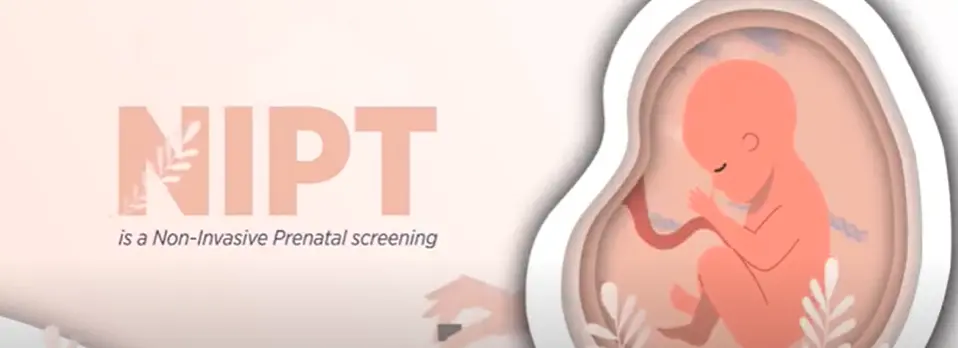Non-Invasive Prenatal Testing (NIPT) is a groundbreaking blood test that has revolutionised prenatal care. Unlike traditional screening methods, NIPT offers a higher degree of accuracy and is less invasive, making it a preferred choice for many expectant mothers. This article delves into the specifics of NIPT, its advantages, and its role in detecting chromosomal abnormalities and the gender of the baby.
What is NIPT?
NIPT is a blood test performed on pregnant women to screen for certain genetic conditions in the developing fetus. This test analyses small fragments of fetal DNA that are present in the mother’s blood. Typically performed after the 10th week of pregnancy, NIPT is more accurate than traditional first-trimester screening tests.

How Does NIPT Work?
During pregnancy, some of the baby’s DNA circulates in the mother’s bloodstream. NIPT involves drawing a blood sample from the mother, from which fetal DNA is extracted and analyzed. This DNA analysis can detect chromosomal abnormalities such as Down’s syndrome (Trisomy 21), Edwards’ syndrome (Trisomy 18), and Patau’s syndrome (Trisomy 13).
Advantages of NIPT
- Higher Accuracy
One of the primary benefits of NIPT is its high accuracy. Traditional screening tests, such as the combined first-trimester screening, have a higher rate of false positives and false negatives. NIPT, however, offers a more reliable detection rate for chromosomal abnormalities. This accuracy reduces the need for invasive diagnostic tests like amniocentesis or chorionic villus sampling (CVS), which carry a small risk of miscarriage.
- Early Detection
NIPT can be performed as early as the 10th week of pregnancy, providing early insights into the baby’s health. Early detection allows expectant parents to make informed decisions and prepare for any potential medical needs their baby might have.
- Non-Invasive Procedure
Unlike amniocentesis or CVS, which require the insertion of a needle into the uterus, NIPT is a simple blood draw from the mother’s arm. This non-invasive nature significantly reduces the risk to both the mother and the fetus.
- Gender Determination
In addition to screening for chromosomal abnormalities, NIPT can also determine the baby’s gender early in the pregnancy. This information can be a source of joy and excitement for many parents.
Conditions Detected by NIPT
- Down’s Syndrome (Trisomy 21)
Down’s syndrome is a genetic disorder caused by the presence of an extra chromosome 21. It leads to developmental delays and physical characteristics such as a flat facial profile and short stature. NIPT has a high detection rate for Down’s syndrome, making it an effective screening tool.
- Edwards’ Syndrome (Trisomy 18)
Edwards’ syndrome is a serious genetic condition caused by an extra chromosome 18. It often results in severe developmental and physical abnormalities, and many affected babies do not survive beyond infancy. NIPT can detect a high probability of Edwards’ syndrome, allowing for early intervention and decision-making.
- Patau’s Syndrome (Trisomy 13)
Patau’s syndrome, caused by an extra chromosome 13, is a severe genetic disorder associated with multiple congenital anomalies and a high mortality rate. NIPT’s accuracy in detecting Patau’s syndrome helps expectant parents understand their baby’s condition early in the pregnancy.
- Limitations of NIPT
While NIPT is highly accurate, it is important to note that no screening test is 100% accurate. False positives and false negatives can occur, albeit at a much lower rate compared to traditional screening methods. Therefore, if NIPT results indicate a high risk of a chromosomal abnormality, confirmatory diagnostic testing, such as amniocentesis or CVS, is recommended.
- Who Should Consider NIPT?
NIPT is recommended for women who have been identified through previous screening tests as having a higher chance of carrying a baby with a chromosomal abnormality. Additionally, it is often suggested for women over the age of 35, those with a family history of genetic disorders, or those who have had abnormal ultrasound findings.
Why Choose Citicare for NIPT?
At Citicare, we offer the best NIPT services in Dubai. Our state-of-the-art facilities and experienced medical professionals ensure accurate results and compassionate care. Trust Citicare to provide you with the highest quality prenatal testing and support throughout your pregnancy journey.
Conclusion
NIPT represents a significant advancement in prenatal screening, offering a safer, more accurate, and less invasive option for detecting chromosomal abnormalities. By providing early and reliable information, NIPT empowers expectant parents to make informed decisions about their pregnancy. While no screening test can guarantee 100% accuracy, the benefits of NIPT make it a valuable tool in modern prenatal care.
Follow us on Social Media
